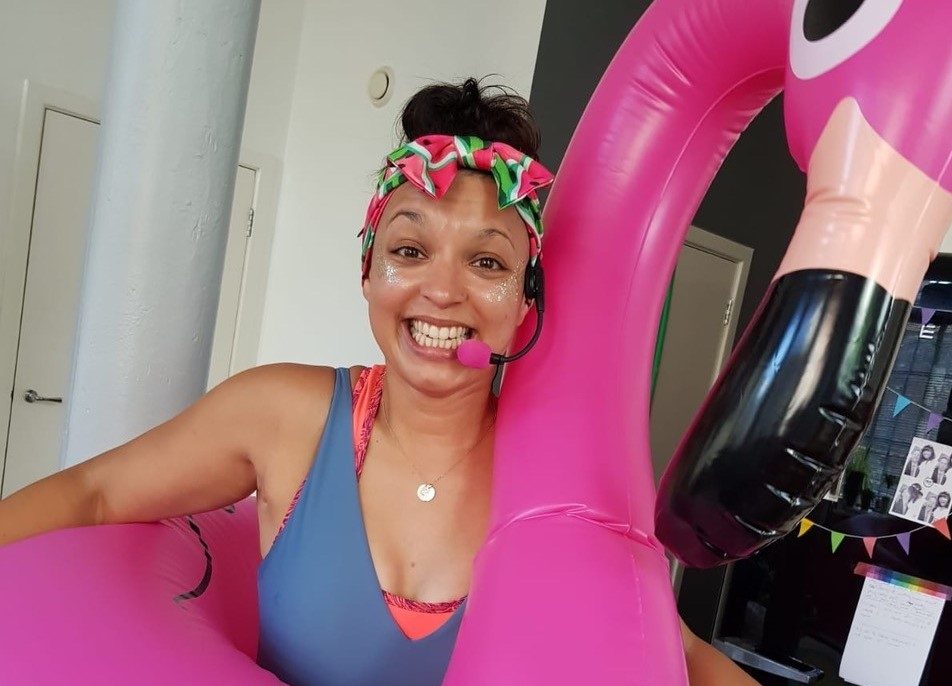
The women in sport leading us through lockdown
Published
By now, it is evident to us all that COVID-19 has rocked women’s sport. However, one area that the debate around COVID-19 and women’s sport has overlooked is how lockdown is impacting women in sports leadership.
We know from our work in our Beyond 30 campaign that women are underrepresented in positions of sports leadership. This is also true of the fitness industry – according to the Register of Exercise Professionals, just 38% of registered personal trainers in the UK are women. With gyms closed and in-person sessions suspended, women sports leaders have had to innovate. In lockdown, there is only one way to go – online.
With a return to in-person sport on the horizon, how could the sector change as a result? Could the decentralised structure of technology allow more women to become sports leaders without the barriers of the industry’s traditional gendered hierarchies?
We spoke to four female fitness instructors who have taken the COVID-19 lockdown as an opportunity to support others in adapting to the new demands of life in lockdown to see what they had to say.
Sportswomen innovating online during lockdown
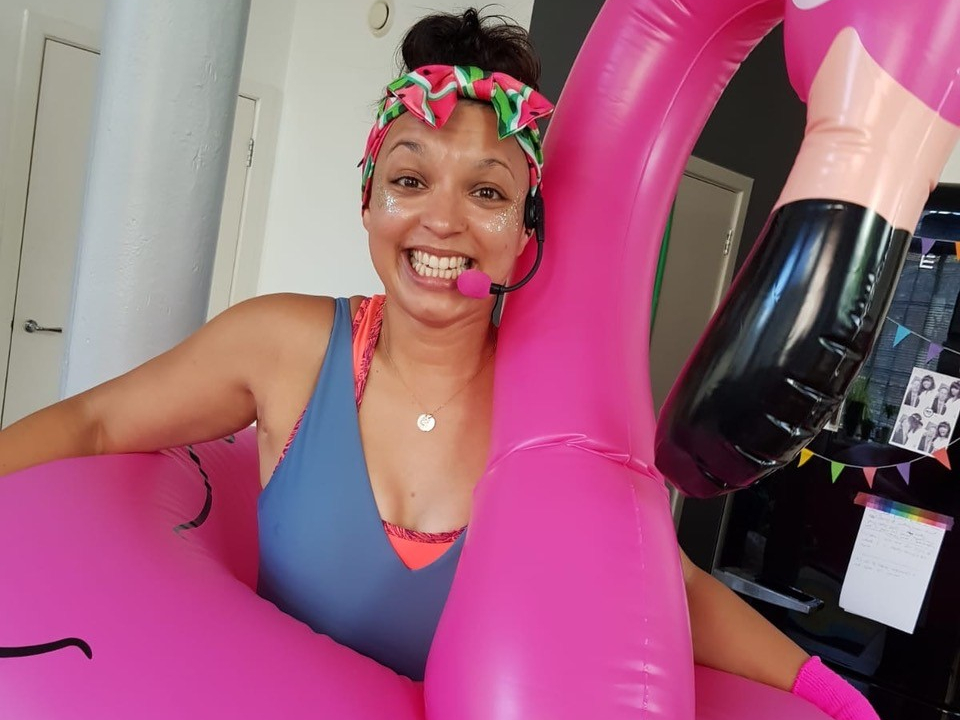
For many freelance fitness instructors, the week before the UK went into lockdown was make or break, with a matter of days to formulate an entirely new business strategy based around online sessions. Carly Wilkinson, an instructor based in Bristol, worked for 15 hours on the Thursday when lockdown was announced to digitise her platform, Project HB.
“I put my timetable together, worked out how to do all the technology. There was only me, so it was very much learning about the technology, thinking about how the delivery was going to change online, thinking about how to advertise it.”
But Geraldine Jennings – an aerobics instructor who has been training women for over 30 years – wasn’t sure at first whether she could make the transition online.
“If you said to me a year ago that I’d be teaching over the internet I would have said no, I won’t – how could I get my personality across and gain their trust?” Soon, though, she realised that some of her older clients who were living on their own would really benefit from continuing their sessions, so she started doing some personal training sessions over Zoom.
Both Carly and Geraldine were stepping into a complete unknown. However, a captive audience was waiting for them. Home fitness has boomed under lockdown – in fact, sales of home fitness equipment have grown 170% since March.
However, if there’s one area of the sports sector where women were already well-represented, it’s online. Katie Grover founded West Beach Fitness around 14 months ago – an online community of workouts, nutritional advice and support for women based in Whitstable. She says, that, “if anything the groups have just grown, which is incredible because there’s even more energy.”
For others, lockdown was a new opportunity entirely. Xiwen Li received her yoga teaching qualification in January, and after just a few months of leading sessions in person, found herself in quarantine on her travels in Jordan. Unable to return home to China, Xiwen took this challenging experience and decided to use her time to help others through free online yoga classes.
Active women in lockdown
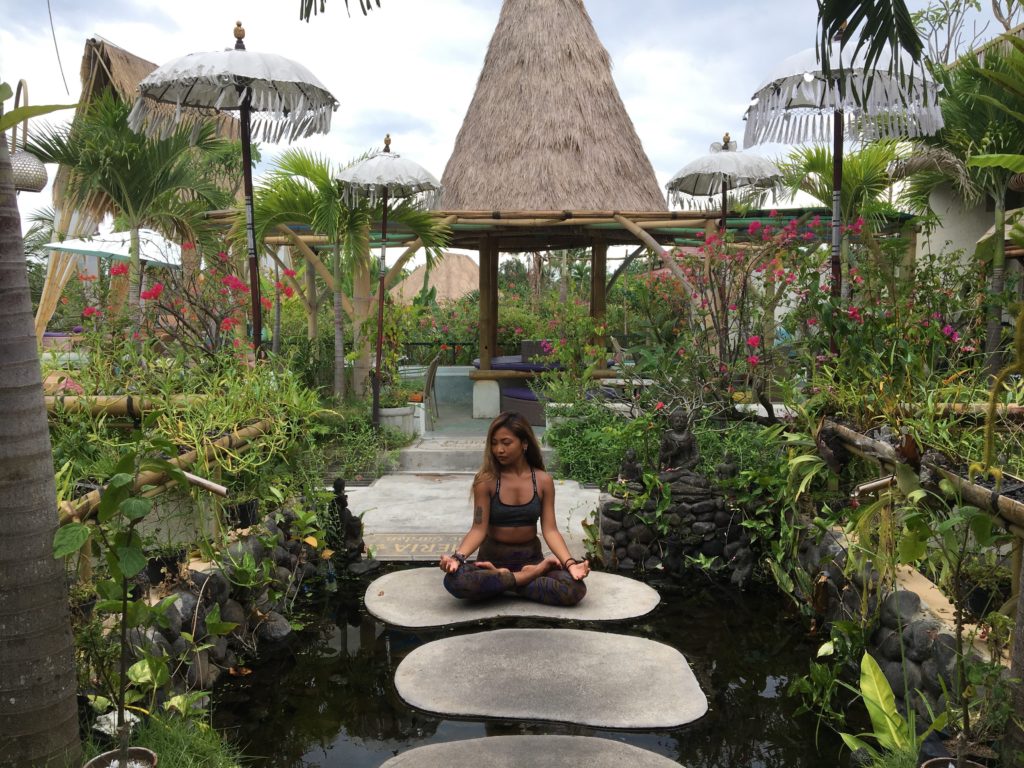
While women’s sport appears to be being deprioritised by many at the elite level, sport and exercise has perhaps never been so valuable in our lives. Data collected by Sport England found that in the first six weeks of lockdown, 63% of people identified exercise as being important for their mental health.
However, whilst men have been exercising more than they were pre-lockdown, more women are doing less activity than usual during lockdown, largely due to caring responsibilities. (Fawcett Society) This makes convenient at-home workouts a powerful tool for many women in lockdown.
As Carly explains, “Movement brings a sense of independence, autonomy and empowerment. If you are a woman, regardless of your situation, there are societal ideas that you should be looking a certain way, acting in a certain way. Movement in lockdown can help people remember that they are an individual.”
Katie observed a telling shift of demand among her already-digitised following, with a marked surge in uptake in her six-week reset programme. To her, this makes sense: “When lockdown was announced, people were looking for something time-bound that they could depend on, because otherwise you’d have this big stretch of time ahead of you and you could lose focus.”
The increased flexibility of online exercise makes it even more accessible. Katie, Geraldine and Carly all commented that having more time slots available allowed those who work long or irregular hours to create a routine out of online workouts, whether joining in live or following a pre-recorded session.
For Carly’s new clients, the online format is a less intimidating way of working out than in-person classes. She says, “What’s been really interesting for me is the amount of people who’ve said, ‘I’ve always been too self-conscious to come to a class, you being online has allowed me to join in and now I can see that this isn’t scary.'”
Xiwen agrees, noting that in yoga, “a lot of people will go to the studio and feel bad if they see someone next doing a pose they can’t do. But when you’re at home with an online instructor you’ll just do it and try whatever you want to.”
Carly has also seen her group demographics expand, saying, “It’s been amazing to see the diversity of ages and sizes of people, and people with their children, which is great because I want to appeal to people across the whole spectrum and help them to celebrate their bodies.”
She hopes that the increased visibility of women fitness instructors during lockdown will help to attract more women from all cultural and ethnic backgrounds to participate in activity:
“I’m mixed race, and I often forget to talk about that. I want to be accepted as I come. But maybe I can inspire another woman who’s mixed race to think, ‘Okay, she’s loud and she’s proud, so maybe I can do this too.'”
Looking forward
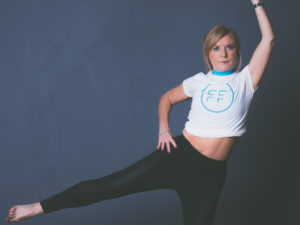
As things start to return to normal, the hope is that people will be keen to keep up their new healthy lifestyles remotely. We asked the instructors which changes – if any – they might maintain as we begin to return to the new normal.
Despite her initial reservations, Geraldine has discovered the value in online sessions, even for her older demographics. “I think there will be some people who, as they get older, maybe drop out of the village hall class as they feel they can’t keep up, so this could be one way of keeping people exercising longer.”
Katie also plans to incorporate more live online sessions into the West Beach Fitness platform. She says, “Online fitness takes away one of the barriers to women for exercise, and the more barriers we can look to remove to make fitness as easy and as accessible as possible, the better.”
Online sessions are not just convenient for participants, of course, but can be a great option for instructors, too. Carly plans to keep a couple of online classes running per week, saying, “I was on the edge of burnout just before this, travelling between two cities with really early mornings and really late nights. Online classes work well for my own mental and physical health.”
Interestingly, when asked about their experiences, the instructors we spoke to had mixed responses. Geraldine said she had never experienced sexism in her career, whereas Carly has encountered limiting attitudes towards her success as a woman in sport. “The amount of men who have insinuated that the reason why I am where I am today is because of them and how they have given me opportunities in their gyms… lockdown has been amazing for me in the sense that people who’ve told me this in the past can now see that I’m doing it on my own merit.”
Although she feels she hasn’t noticed any difference in treatment due to her gender, largely because she has always operated independently, Katie had a similar experience when searching for business mentorship. She says, “I approached a man and he really cut me down, telling me I could never make a business out of online fitness.”
Her response? “I just found a different – female – mentor who was amazing and had set up an online training platform herself. If I’d taken his advice and I hadn’t grown my business in the way I wanted to, I’d have a lot of people right now stranded without my real-life services.”
Lockdown is proving to the traditionalists of the sports industry that there are many ways to run a successful fitness enterprise. In fact, Xiwen believes that lockdown presents the opportunity for many outdated perceptions to shift. She says:
“I had one male student here in Jordan, who had never done yoga before. He told me he thought yoga was for girls. He was interested in trying it, but never had the chance because when you go to a studio as a man people wonder why you’re there. I think a lot of these things are slowly starting to change in lockdown.”
Women in digital sports leadership
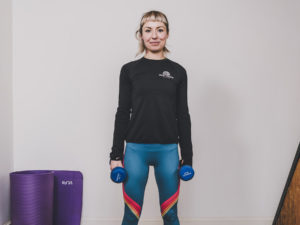
So how might the legacy of lockdown provide new opportunities for women to excel in non-traditional sports leadership?
Well, in some ways, the suspension of physical institution can remove practical barriers for career progression. Xiwen, for example, is currently doing her 300 hours’ yoga teacher training online, which provides a more affordable alternative to in-person training and allows her to complete classes around her other studies.
Geraldine echoes the opportunity in flexibility, explaining that traditionally, instructors and trainers had to earn a living over seven days, following other people’s timelines. “So, maybe” she says, “it will help in that sense for women to have more flexibility to become leaders and earn more money in the industry.”
Significantly, Carly notes that since lockdown, “a lot of the women that I’ve spoken to are now talking about their business – they’re not just talking about being teachers. More women instructors seem to be realising that they can be a business owner – not always just a woman in a gym working for some bloke.”
Katie agrees. “Looking at the instructors whose classes I would go to at the gym, a lot of them have been very entrepreneurial. When lockdown was announced, I invited them all to join some online sessions for free to experience what it’s like, and they are now all growing their online businesses and packaging it differently.”
This is beneficial to all parties, she points out, because it means sports leaders are “thinking creatively about how we’re going to go forward with creating opportunities for people to exercise with more ease.”
The matter of exactly how the digitalisation of sport and exercise under the COVID-19 lockdown will affect the industry long term is yet to be seen.
But one thing we can be sure of is that there are now more women becoming leaders of their own active communities.
However, in order for this much-needed diversification among sports leadership to be sustained, the sector must develop its procedures to better include women at all professional levels – whether that be gyms increasing the availability of flexible working through providing online classes led by instructors, better protection of freelance trainers or a clear pipeline of progression for women to enter senior leadership.
Beyond 30% has now gone beyond the physical world of gyms, leisure centres and offices. We now need to ensure that women remain visible everywhere from the stadium, to the boardroom, to the news feed.
